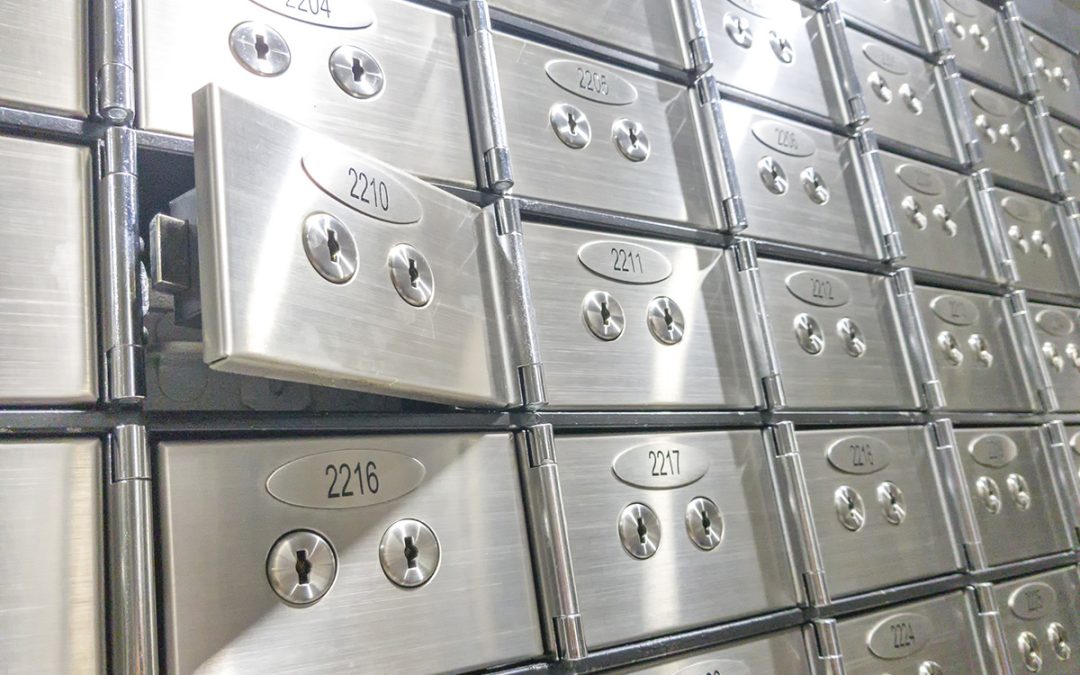Is A Safety Deposit Box Worth It?
If you’re looking to protect your valuable possessions, you may have thought about using a safety deposit box.
But are safety deposit boxes secure and worth storing items in?
Renting a safety deposit box is absolutely worth it and an excellent place to store irreplaceable and important documents that you don’t need to access very often. Safe deposit boxes are more secure than your home because they are usually kept in weather-proof bank vaults.
Although it’s great to keep items in a safety deposit box, it’s important to understand how they work and what valuables to keep inside of them. Now that we’re living in the digital age, there are more innovative solutions in terms of where to store certain documents.
What Is A Safety Deposit Box?
A safety deposit box, also known as a safe deposit box, is an individual container that’s kept in the vault or safe of a federally insured bank or credit union. Safe deposit boxes are typically made out of metal and are used to protect valuables, sentimental items, and important documents.
The boxes come in various sizes but usually don’t get larger than 10 inches by 10 inches and two feet deep. If you’ve ever seen a bank heist movie, I’m sure you know what a bank vault looks like.
Bank vaults are highly secure locations that are equipped with video cameras, security guards, alarms, and state-of-the-art safety locks. They’re also reinforced to withstand floods, fires, tornadoes, and hurricanes.
How Do Safety Deposit Boxes Work?
You can rent a safety deposit box from most banks, but we recommend using a bank where you have an account already. After signing the lease agreement for the box, you have the choice to add co-lessors (co-renters) who will have equal access and rights to the contents of the box. Then, the bank will give you a key that’s used to open your safety deposit box.
Safety deposit boxes have two keyholes, which means you need two keys to open your safe deposit box. The second key, called the guard key, is held by the bank or credit union. You will hold onto the first key.
The double key system means that your precious items are extremely secure. Even if someone steals your key, they won’t be able to gain access to the guard key since they can’t confirm your identification.
With Trustworthy, all of your important documents and assets are beautifully organised and securely protected. Most importantly, you and your trusted professionals can access them anytime and anywhere.
4 Factors To Consider Before Opening Up A Safety Deposit Box?
Before you run over to the bank and open up your safety deposit box, there are 4 essential factors to consider. Even though safety deposit boxes are great at storing valuable items, they aren’t the perfect solution for everyone.
Let’s dive into each factor.
1. What Items to Keep in a Safety Deposit Box?
You should avoid storing items in a safety deposit box that you might need during an emergency. Since you can only access your safety deposit box during the bank’s hours, you may need certain items on a whim’s notice.
So I don’t recommend keeping passports, medical directives, powers of attorney, and the only copies of your will in a safety deposit box. Good items to keep in a safety deposit box include:
- Contracts and business papers
- Military discharge papers
- Stock and bond certificates
- Small collectibles and family heirlooms
- Birth certificates
- Marriage licenses
- School transcripts and diplomas
- House deeds
These are all items that are hard to replace and that you won’t need to access frequently.
2. How Often Do You Need to Access Your Safety Deposit Box?
Depending on what items you plan to keep in your safety deposit box, it can be a hassle constantly running to the bank to retrieve them. You should only keep items in your safety deposit box that you don’t need access to for an extended period of time.
This may not be an issue if your bank is near your home. However, banks that are located far away from your home will not be ideal if you have to access your safety deposit box frequently.
3. Do You Want to Share Access to Your Safety Deposit Box?
You should also consider if you want anybody else to have access to your safety deposit box. Since you’re allowed to add co-lessors to the box, you may want to add a spouse or family member. But remember, the co-lessor will have complete access to the contents in the box. The person you choose to add should be someone you completely trust.
In case of an emergency, it can be helpful to give somebody access to your safety deposit box. For example, if the owner of a safety deposit box dies and there’s no co-lessor, retrieving the contents within the box is a complicated process. Anyone seeking access to a safe deposit box after the owner’s death will need a court order from a judge.
However, co-lessors will have access to the safety deposit box, even if the owner passes away.
Compared to safety deposit boxes, Trustworthy allows much more flexibility around who can access your records, how long they have access for, and which documents they can see. For example, you can invite your spouse as a collaborator to access all your information, while inviting your accountant to review your finances only during tax season.
4. Are Safety Deposit Boxes Insured?
The Federal Deposit Insurance Corporation (FDIC) does not insure safety deposit boxes. If something were to happen to your safety deposit box, like a fire burning the bank vault down, your destroyed valuables would not be insured.
For this reason, I don’t recommend storing cash or highly expensive possessions inside a safety deposit box. The FDIC only insures money inside of a federally insured bank or credit union account, so it’s better to keep your cash inside of a checking or savings account.
However, you can purchase insurance on the items in your safety deposit box if you want to store expensive valuables inside it. It will cost more, but third-party insurance is the only way to protect your safety deposit box from damage.
Is It Hard To Set Up A Safety Deposit Box?
Opening a safety deposit box is straightforward and simple. Ask the branch you currently bank at if they offer safety deposit boxes, the box sizes, and the rental rates. Most banks offer a discount on their safe deposit boxes for established customers, so I recommend using your own bank.
Once you agree on the safety deposit box terms, the bank will give you a lease agreement to sign and a key. You will then need to sign a safe deposit admission slip to gain access to the vault.
A safe deposit box attendant will bring you to the vault’s viewing area, where you can open, add, and remove items from the box. The attendant will give you the bank’s guard key to open up your box along with your personal key.
You’ll be left alone in private in the vault when you use your safety deposit box. As such, the bank won’t know what you put inside your safety deposit box. Banks also won’t vet your items which is another reason why safety deposit boxes aren’t insured. The bank doesn’t even know what valuables are kept inside.
How Much Do Safety Deposit Boxes Cost?
The cost of renting a safe deposit box depends on your specific branch’s location and the size of the box. Prices can range from £40 per year for a small box up to £350 per year for bigger-sized boxes.
When Should You Open A Safety Deposit Box?
There is no question that safety deposit boxes and bank vaults are safer and more secure than your own home. This is why opening a safety deposit box is a great idea to store important documents, sentimental items, and valuable items that are insured.
Safety deposit boxes are worth it for individuals who are paranoid about keeping important items in their homes. If you live in a region that’s prone to tornadoes or hurricanes, a devastating natural disaster can destroy these items.
You may also think that an at-home safe is a better option than opening a safety deposit box. In the case of a home robbery, robbers could force you to open the safe or steal the entire safe. For this reason, getting your valuable items insured and placing them into a safety deposit box can give you peace of mind.
When Should You NOT Open A Safety Deposit Box?
Safety deposit boxes have been around for over 150 years and have brought safety and security to millions of individuals. However, safe deposit boxes aren’t the best storage solution for everyone.
With the transition to the digital age, digital storage solutions are a better option for keeping important documents safe. Rather than keeping one-of-one physical documents that may get lost or destroyed, you can store them digitally.
For more information on A Safety Deposit Box contact Soteria Safes.
The original version of this article was published in www.trustworthy.com


Recent Comments